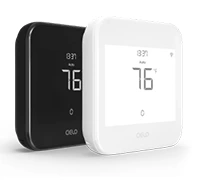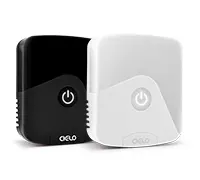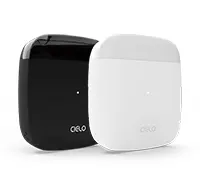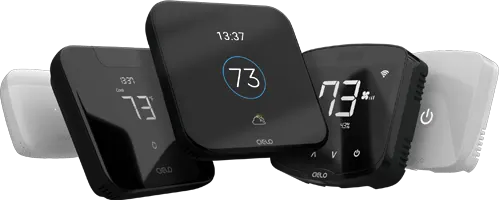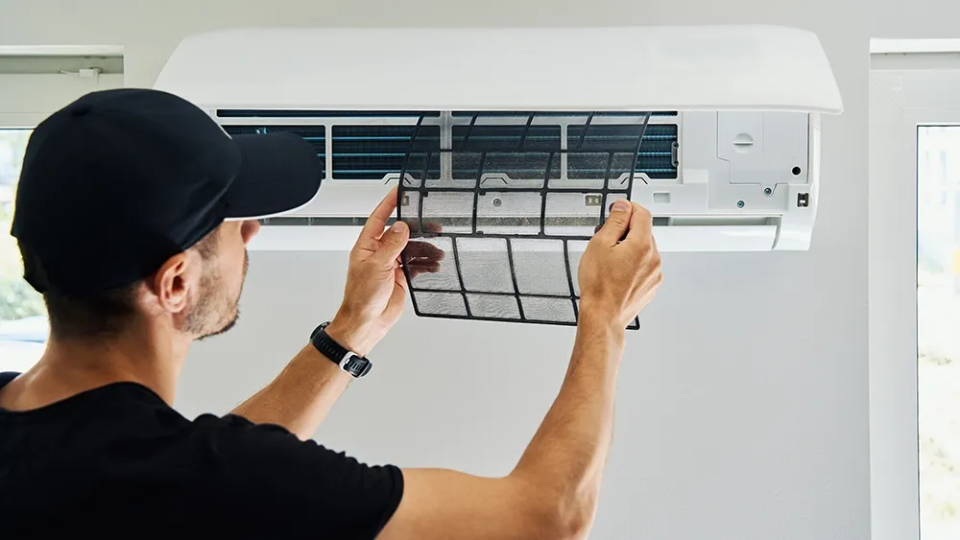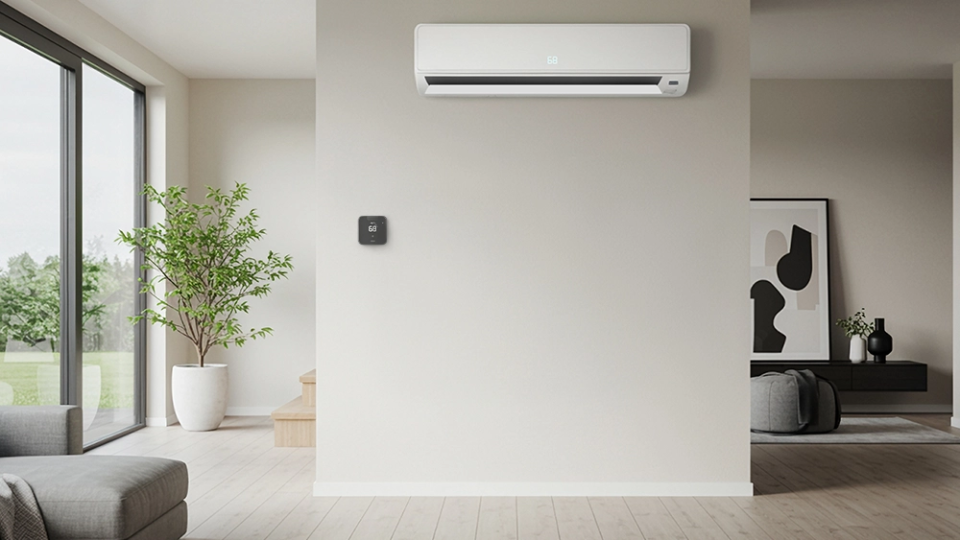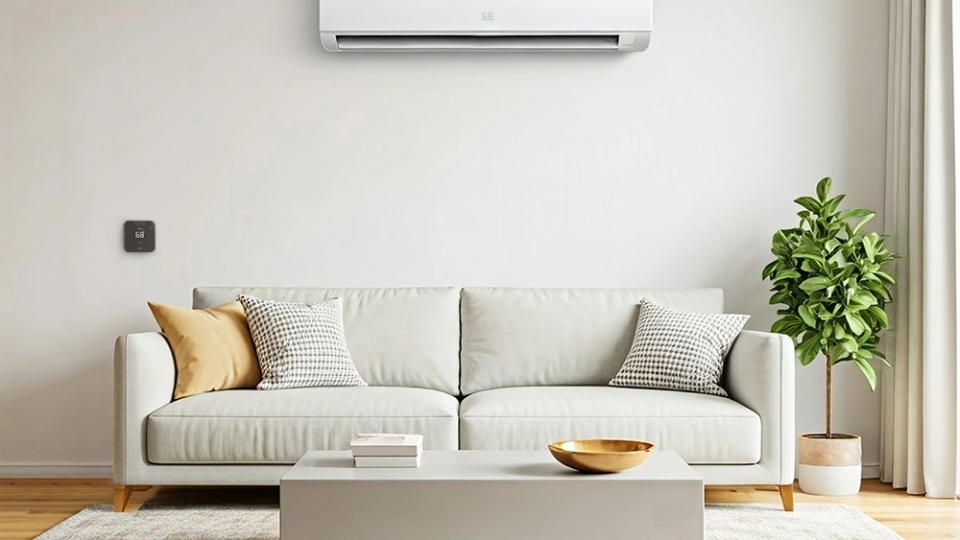
Key Takeaways
- Portable ACs are easy to install and move around, while window ACs are fixed and require more installation effort.
- Window ACs are more energy-efficient than portable units and also offer better cooling capacity.
- Select your AC based on factors such as room size, mobility requirements, and desired energy efficiency.
When it comes to cooling your space, choosing the right air conditioner can make all the difference in achieving your ideal home temperature. Among the myriad options available, window and portable air conditioners are the two popular choices. Each type comes with its unique set of features, advantages, and drawbacks.
This portable AC vs. window AC blog will discuss these two units in detail, highlighting their pros and cons. Additionally, it will explore the differences between their installation processes, maintenance needs, efficiency, and more. This will help you better understand which one best fits your needs and preferences.
- What Is a Portable Air Conditioner?
- Pros & Cons of Portable AC Unit
- What Is a Window Air Conditioner?
- Pros and Cons of Window AC Unit
- Window AC vs. Portable AC: Key Differences
- When Does Choosing a Portable AC or Window AC Make the Most Sense?
- How to Make Your Portable & Window Air Conditioners Smart?
- Bottom Line
What Is a Portable Air Conditioner?
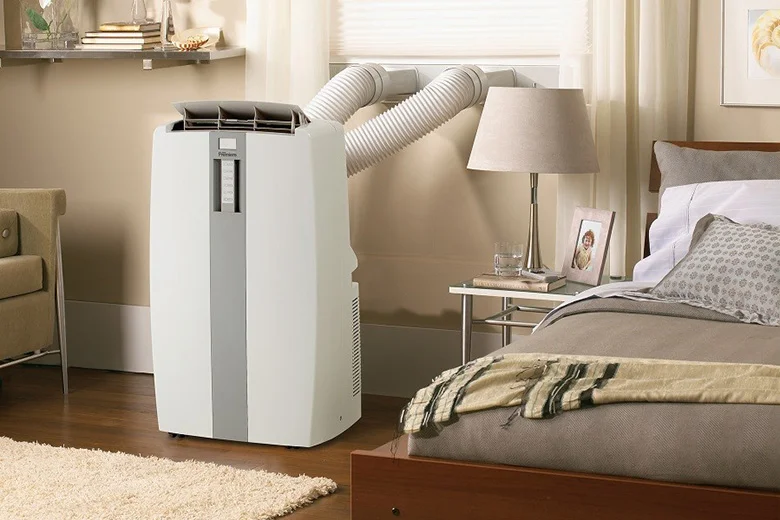
A portable air conditioner is a self-contained unit designed to cool a specific area. It works just like any other AC unit, taking in air from the inside, cooling it, and then circulating it back into your room. However, unlike traditional air conditioners that are fixed in one spot, portable ACs can be moved from room to room as needed.
These units come in two types: single-hose and dual-hose. Single-hose units have one hose that expels the hot air outside. Dual-hose units have one hose for taking in air from the outside and another for expelling the heat outside.
Pros & Cons of Portable AC Unit
| Pros | Cons |
| Easy to install with minimal tools. | Requires regular maintenance (draining condensation). |
| Portable and can be moved between rooms | Less energy-efficient |
| No permanent changes to your home | Noisy |
| Ideal for small spaces or rentals | Limited to cooling smaller rooms. |
| No permanent window blockage | Takes up floor space and can be bulky |
What Is a Window Air Conditioner?
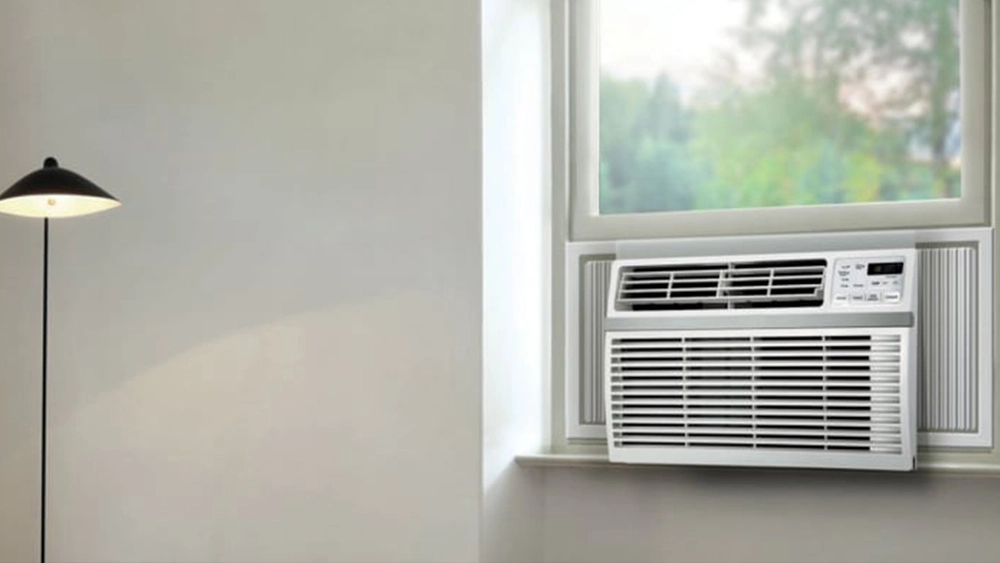
A window air conditioner is a single unit designed to be mounted in a window. Among the various types of air conditioners, the window AC stands out as a popular choice for cooling single rooms and small apartments due to its ease of installation and cost-effectiveness.
It also works similarly to portable AC—it pulls in air from inside, cools it, and then recirculates it back into your home. The difference is that the window unit stays fixed in one place. If you want to cool multiple rooms, you will have to invest in multiple units.
Pros and Cons of Window AC Unit
| Pros | Cons |
| Frees up floor space inside the room | Installation involves heavy lifting |
| Energy-efficient cooling for individual rooms | Fixed in place, not portable or easily moved |
| Quiet operation since the compressor is outside | obstructs the view and limit window functionality |
Window AC vs. Portable AC: Key Differences
When choosing between a window air conditioner and a portable air conditioner, there are several differences to consider:
-
Ease of Installation
Portable air conditioners are known for their easy installation process. You don’t need any special tools or professional help to set them up. This makes them an excellent choice for people who are not particularly handy or who want a quick and temporary solution to beat the heat. The installation is straightforward and can be completed in a matter of minutes. You just have to put the exhaust hose out of the window, seal the area around it, and plug in the AC.
Installing a window air conditioner can be a bit more challenging than setting up a portable unit. They are quite heavy, and you require assistance in picking them up and putting them in the window. Handling them on your own can be dangerous. Moreover, you have to fit it securely in the window frame, which may involve additional tools, support brackets, and weather stripping.
Easy to Install: Portable AC
-
Mobility & Flexibility
One of the biggest advantages of portable air conditioners is their mobility. Equipped with caster wheels, these units can be easily moved from one room to another. This flexibility is particularly beneficial for those who live in rented apartments or houses where permanent installation of an air conditioning unit is not possible. However, you will have to set up the hose every time you move your unit around.
Once installed, a window AC is fixed and cannot be moved to another room. This lack of mobility means that you need to invest in multiple units if you want to cool different areas of your home. While this is not an issue if you only need cooling in one room, it can be a disadvantage for those who require flexible cooling solutions.
Most Mobile: Portable AC
-
Cooling Capacity & Efficiency
Window ACs typically offer a higher cooling capacity than portable units, making them suitable for cooling larger spaces. Their powerful performance ensures that the desired temperature is reached quickly and maintained consistently.
Portable ACs, on the other hand, are usually less efficient at cooling than other types. They need more BTUs to cool a smaller space, which means they use more electricity.
Portable vs window AC efficiency: Window AC
-
AC Cost
The cost of both window and portable air conditioners varies greatly depending on the brand, efficiency rating, and the size of the area they can cool. Portable air conditioners cost $100 to $500, depending on the size. In contrast, window air conditioners that cover the same square footage have a wider price range, from about $150 to over $800.
Both types of air conditioners fall within a similar price range, so there isn’t a clear winner in terms of cost.
Related: How Much Does an Air Conditioner Cost?
Cost Effective: Tie
-
Quieter Operation
Window air conditioners tend to operate more quietly compared to portable units. Since the compressor and other noisy components are located outside the room, the indoor noise level is significantly reduced. This makes window ACs a better choice for bedrooms, home offices, and other areas where a quiet environment is essential. While no AC is completely silent, the noise produced by window units is generally less intrusive, providing a more comfortable and peaceful indoor atmosphere.
Quietest: Window AC Unit
Related: How to Reduce Air Conditioner Sound for Peace and Quiet
-
Maintenance
Both window and portable units need regular AC maintenance, such as cleaning the air filters. However, with portable units, you may also need to frequently empty the water collection bucket or tray.
Easy to Maintain: Window AC
When Does Choosing a Portable AC or Window AC Make the Most Sense?
The portable AC vs. window AC battle depends on your specific needs and circumstances. Here are some scenarios to consider:
-
Space and Layout
A portable air conditioner occupies floor space and might necessitate rearranging your furniture to accommodate it.
In contrast, a window unit is installed directly in the window, keeping it out of your living space and preventing any added clutter in your home.
If you have limited floor space, a window AC is the better choice. On the other hand, if your windows are not suitable for an AC installation or you cannot modify your living space, a portable AC is more practical.
-
Window Accessibility
Once window units are in place, they’re likely to stay there for the season, blocking both light and view through that window. So, if you want to use the windows, a portable AC makes more sense.
-
Mobility Needs
If you need to cool different rooms at different times, a portable AC offers the flexibility to move the unit as needed. This is particularly useful for renters or those who frequently rearrange their living spaces.
-
Energy Savings
If long-term savings are your priority, a window AC is generally more efficient and cost-effective.
-
Noise Sensitivity
For quieter operations, especially in bedrooms or home offices, window ACs are typically the better choice. Portable ACs, while convenient, tend to be louder as the whole system is inside.
How to Make Your Portable & Window Air Conditioners Smart?
Both window and portable ACs that come with an IR remote can be made smart by integrating them with smart thermostats for room air conditioners.
By equipping your units with smart capabilities, you can control them through your phone and enjoy a variety of features, such as scheduling and location-based triggers. You can adjust the settings throughout the day, no matter where you are, all from the palm of your hand. This level of control not only optimizes comfort but also ensures efficient energy consumption, ultimately saving you money. You can even integrate them with Alexa or Google Assistant, allowing for seamless operation and coordination.
Your best choice to make any mini-split, window,
or portable AC smart. Enhance your comfort and savings.
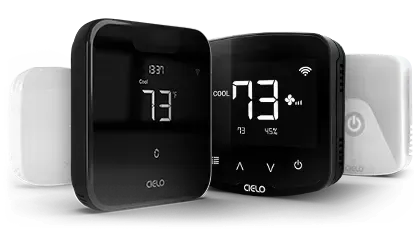
Bottom Line
When choosing between a portable AC unit vs. a window AC unit, it’s important to consider factors such as installation method, efficiency, and cost. Window air conditioners generally offer better energy efficiency and lower operational costs over time. However, portable air conditioners provide flexibility and ease of installation, making them suitable for smaller spaces or short-term use.
